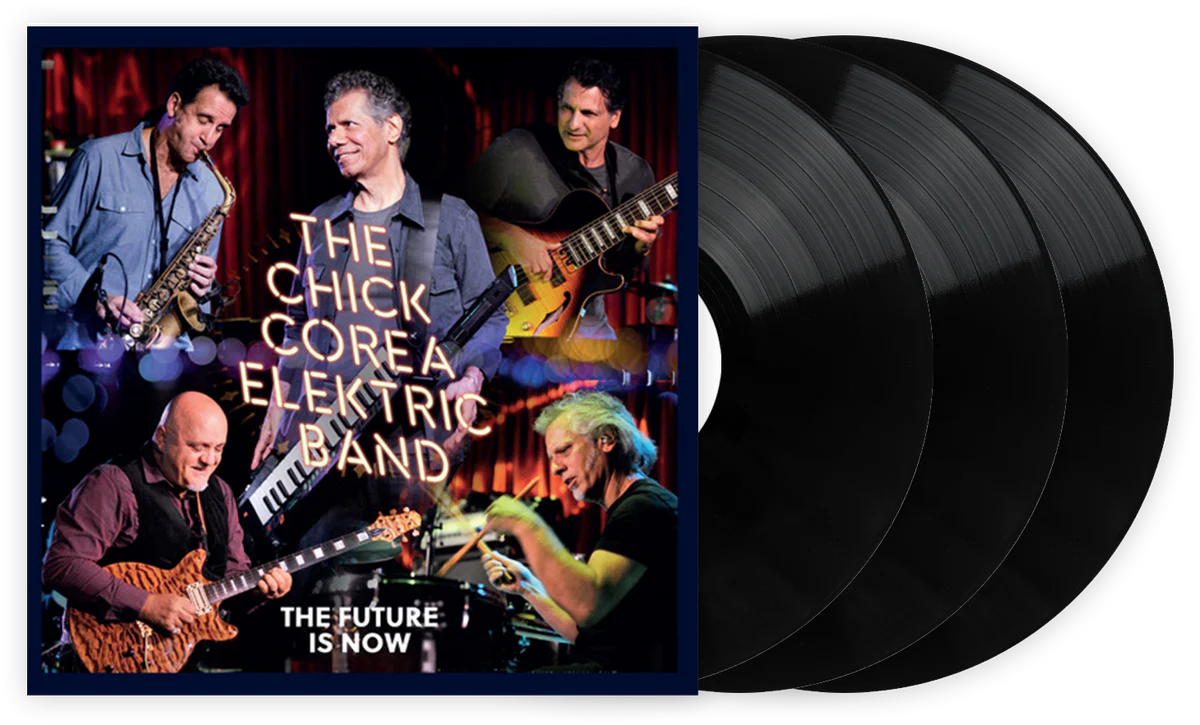Chick Corea's Elektric Band Takes a Final Bow on "The Future is Now"
The Jazz Fusion Experts Go Out With a Standing Ovation
Prog rock and jazz fusion both have an otherworldly quality. I’ve never seen either live, so listening to recordings created with the intense discipline, musicianship, and complexity these styles demand, I’m often amazed that real people are behind the instruments. If you feel that way, you’ll find the late Chick Corea’s Elektric Band's latest live album, The Future is Now (Candid), a mostly accessible showcase of high-level musicianship combined with out-of-this-world compositions.
The Elektric Band’s final tour in 2018 became an unexpected farewell as Corea passed away from cancer in 2021. This triple LP, recorded live in 2016, 2017, and 2018, was compiled by Corea before his death. Although it serves as a tribute to the legendary composer and performer, it’s not entirely posthumous. Corea was deeply involved in putting this project together. The vinyl set includes detailed reflections from all members of the Elektric Band: John Patitucci, Dave Weckl, Eric Marienthal, and Frank Gambale.
Jazz fusion tends to be a genre you either love or dislike. I usually fall somewhere in between. While I respect the compositional and playing skills involved, I’m not a fan of virtuosity for its own sake. I felt comfortable reviewing this album because the Elektric Band consists of consummate professionals who often achieve their artistic goals. I can accept that some of the music might be over my head and slightly anxiety-inducing. Another reason I felt connected to this album is nostalgia: many years ago, my father bought me a copy of GRP Super Live (GR-2-1650) on vinyl, which featured Chick Corea’s Elektric Band on the second disc. Though I didn’t fully connect with it, I enjoyed it and absorbed a lot from it.
Frank Gambale's playing is "technical", but his choices remain tasteful. My favorite Gambale moments on the album are when he employs the acoustic guitar on “Alan Corday,” a stunning sixteen-minute epic that might be my favorite track. Corea’s precision playing on “Trance Dance” highlights his skill and gives other band members their moments to shine. Eric Marienthal’s sax solos are particularly enjoyable, always perfectly nestled in the composition’s melodic pocket. The crowd’s enthusiastic cheers and applause punctuate the musical brilliance throughout the record. If you want a taste of The Future is Now, start with “Trance Dance.”
Sparks fly during Chick Corea and Dave Weckl’s percussive exchange on “CTA,” a piece by the late Philly saxophonist Jimmy Heath. Fender Rhodes enthusiasts will be delighted by the instrument’s prime examples on this recording. Corea’s keyboard setup is impressive, blending analog keys with digital patches for a modern edge. I’m not sure if the Fender Rhodes sounds are from vintage instruments or high-quality emulators, but they sound excellent.
The pressing I received is very good—reasonably quiet and easy to listen to—though some Discogs commenters have reported issues, particularly with disc 3. The Elektric Band’s trademark use of digital instruments and processing can imbue an excessive level of brightness to their recordings, but Bernie Grundman’s mastering and Dave Weckl’s mixing avoids any unpleasant digital sheen. With plenty of headroom, you can crank it up and recreate the live experience at home. The album jacket is sturdy but, being a triple disc set, it’s prone to wear. Disc 2 tends to slide precariously into the middle panel of the fold-over jacket, reminiscent of old Unipack designs. Handle with care to avoid ripping the cover!
“Beneath the Mask” shows the group soaring to new heights and clearly enjoying themselves. The Future is Now offers a high-grade, master's-level progressive jazz experience, with the Elektric Band operating on another plane. You might want to grab a towel for Dave Weckl after listening to “Johnny’s Landing,” where his drumming, especially near the end of the eighteen-plus-minute track, is industrial-grade stuff. It’s an excellent show of technique, but is it too excellent?
The album concludes with “Got a Match,” originally 5:38 on their debut album but stretched to 18:47 here. This extended version diverges from the original’s tight melodic structure and cohesive groove, embodying the magic of revisiting live music created several decades ago. So, is the version “Got a Match” on The Future is Now one song, or is it a medley of several musical ideas? And there - I suppose - is the intersection where I am apt to lose the jazz fusion thread.
At one hour and fifty-eight minutes, it’s a lengthy album, so clear your schedule or consider listening in smaller chunks. Any old way you choose it, The Future is Now stands as a testament to progressive jazz fusion’s heights and serves as a fitting farewell to Chick Corea’s work with his Elektric Band.










































.png)








